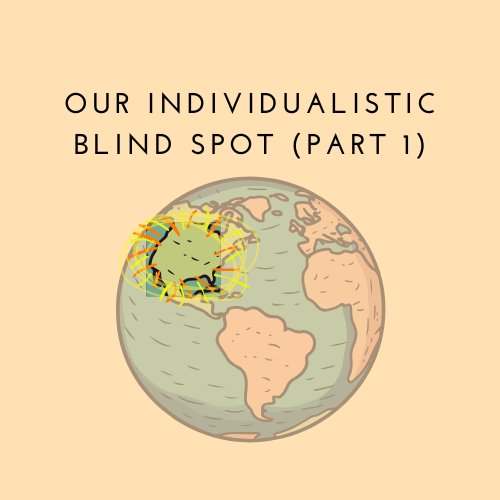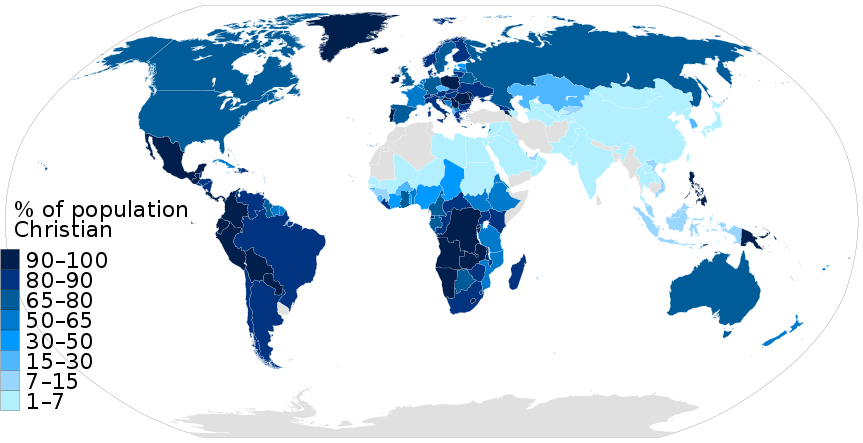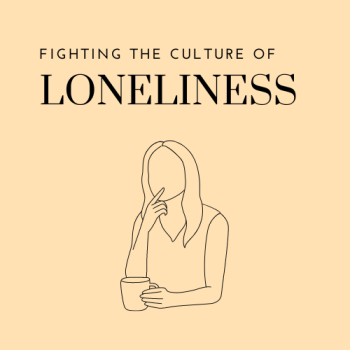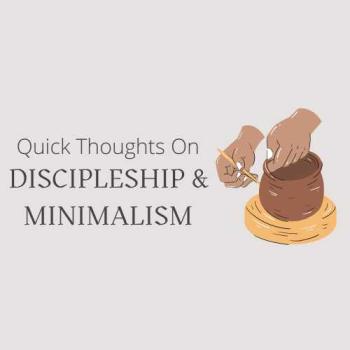 Imagine you’re driving down the freeway when you notice the vehicle ahead of you is going a lot slower than you are. You set your blinker, take a quick glance over your shoulder, and start to merge, when suddenly you’re met with a furious horn demanding you stay in your lane.
Imagine you’re driving down the freeway when you notice the vehicle ahead of you is going a lot slower than you are. You set your blinker, take a quick glance over your shoulder, and start to merge, when suddenly you’re met with a furious horn demanding you stay in your lane.
There was already a car in the next lane, but you missed it. It was in your blind spot. That’s the thing about blind spots. They cause you to miss things that can end up harming you or the people around you.
Social scientists have found that the United States is the most individualistic country in the world.
In the United States, our blind spot looks a lot like a mirror. We think we’re looking at the world through clear glass, but what we’re really looking through is our own reflection. We see the world through ourselves. But if Jesus is truly the Savior of the world, the last thing a Christian should be is individualistic.
The Big Picture
Let’s zoom out from our individualistic perspective, and do some big picture Bible study.
In Genesis 1, God made the first man and woman and said “fill the earth.”
A few short chapters later, the earth was filled; not with people, but with violence. God had to start over, so out of all the humans in the violent world, God elected Noah as his one representative and said, “fill the earth.” The humans after Noah were supposed to scatter and fill the earth, but instead they went to the site of Babylon and said:
“Come, let us build ourselves a city and a tower with its head in the heavens, so that we may make a name for ourselves; otherwise we will be scattered over the face of the whole earth” (Genesis 11:4, emphasis added).
If you recall, scattering over the face of the whole earth was the goal, but the proto-Babylonians built up, not out, and they did so to make a name for themselves. They wanted their head in the heavens, which, even in Hebrew, is a very strange way to say “build a skyscraper.”
If the humans at the Tower of Babel wouldn’t scatter themselves, God would have to do the scattering. So He confused their language and elected one from the many: Abraham. You won’t be surprised to find God telling Abraham to scatter to a new land, before telling him:
“I will make you into a great nation, and I will bless you; I will make your name great, and you will be a blessing” (Genesis 12:2, emphasis added).
Did you catch that? Babel wanted to make its own name great, but God wanted to make Abraham’s name great, so He told Abraham: “All families on earth will be blessed through you” (Genesis 12:3, emphasis added).
This is one of the most important lines in Scripture, revealing the purpose of God’s covenant with Israel: to bless every family, tribe, nation, and tongue on earth.
This is how “election” or “predestination” works throughout the Bible. These are buzzwords in theology, and many wise and faithful Christians believe that election is God’s sovereignty to choose which individuals are saved and which ones are not.
While I agree that God is sovereign, this is simply not the portrait I see from the Bible’s big picture. The full testimony of Scripture reveals that election is about God choosing one from the many – not to save the one and abandon the many, but to bless the many through the one.
So God called a single family to be a blessing to the nations – Israel, or the family of Abraham, Isaac, and Jacob. And Abraham’s family did grow to become a great nation, but more often than not, they did a terrible job of blessing the nations.
But remember, God’s pattern is to choose one from the many to bless the many through the one. So what we need in the midst of the chaos is one person from Israel who God anoints to bless the world. And what does the Bible call an anointed one for the many?
A Messiah. The full story brings us to Jesus, who died as a ransom for many to draw the world to himself.
2,000 years later, there are 2.5 billion Christians around the world, and 65% of those Christians are in Africa, Latin America, and Asia. Christianity is a worldwide faith, because Israel’s Messiah is the Savior of the world (Source: The Center for the Study of Global Christianity at Gordon Conwell Theological Seminary).

This is the big-picture story of the Bible – a cosmic and universal story of a Messiah who comes for the whole world. And it is a story we have often missed as we’ve read Scripture through a unique American blind spot.
The Individualistic Plank in My Eye
Jesus said we ought to remove the plank from our own eyes before judging others for the specks in their eyes. As an individualistic American, I want to learn to remove the self-centered plank lodged in my eye, and it turns out the letter to the Ephesians is a powerful guide.
First, a little context: this letter is all about God reconciling people with nothing in common to become one in Jesus. It shows us how God can bring people of difference together and unite us in our differences. The letter begins with Paul speaking on behalf of Israel, and that scary word “predestined” shows up.
“In him we [Israelites] were also chosen, having been predestined according to the plan of him who works out everything in conformity with the purpose of his will, in order that we [Israelites], who were the first to put our hope in the Messiah, might be for the praise of his glory. And you also [non-Israelites] were included in the Messiah…” (Ephesians 1:11-13, emphasis added).
In the gospels, Jesus comes first to Israel – the one family out of the many. But it’s not because He loves them more. It’s because He chooses the one to bless the many. Israel is the first to hope in the Messiah so that non-Israelites can also be included in Israel’s Messiah!
“God raised the Messiah from the dead and seated him at his right hand in the heavenly realms, far above all rule and authority, power and dominion, and every name that is invoked, not only in the present age but also in the one to come. And God placed all things under his feet and appointed him to be head over everything…” (Ephesians 1:20, emphasis added).
You may recall that Babel tried to put a “head in the heavens” on their own terms — Jesus is the true Head in the heavens.
Babel tried to make their own name great – God gave Jesus the name above every other name.
Babel tried to elevate one nation in one location with one language – Jesus brings together every nation, tribe, and language.
Babel erases difference – Jesus unites difference.
Jesus is the head over all things, bringing the many together to become one. So Paul continues to expand how the heavenly Head is at work: “The church is his body, the fullness of him who fills everything in every way” (Ephesians 1:23).
The earth is finally getting filled! While the first humans filled the earth with violence, and the Tower of Babel was built up to the heavens to avoid filling the earth, now the body of the Messiah fills the earth from the heavens. Which means that our role as the body of Christ is to bring the blessing of heaven to the earth.
Our individualism convinces us that we are self-sufficient, that we can make something of ourselves, and that we can treat others however we want to get our way. But to become a Christian is to become a body part. And when you’re a body part, you don’t stand alone. To be connected to the Head is to also be connected to every other part of the body.
“If the whole body were an eye, where would the sense of hearing be? If the whole body were an ear, where would the sense of smell be? But in fact God has placed the parts in the body, every one of them, just as he wanted them to be. If they were all one part, where would the body be? As it is, there are many parts, but one body” (1 Corinthians 12:17-20).
We don’t elevate ourselves or set ourselves apart as if the hand is more important than the eye or as if the eye doesn’t need the hand. No, a body works precisely because it’s made up of parts that are different, yet work together – like a band made of different instruments playing the same song, or like a football team made of very different players who all run the same play in unison. So in Ephesians, Paul says “Christ himself gave the apostles, the prophets, the evangelists, the pastors and teachers…”
Different body parts have different functions, but why?
“…to equip his people for works of service, so that the body of Christ may be built up until we all reach unity in the faith…” (Ephesians 4:11).
We all come together in our difference – not to become the same – but to serve the whole body. While the world views difference as an opportunity for hostility, Jesus says difference is an opportunity for hospitality.
The mission of the Church is not assimilation. The mission is to send the message to the world that what unites us in the Church is far stronger than what divides us, because what unites us is the Head who brings all things together.
What To Do With the “Self”
“You were taught, with regard to your former way of life, to put off your old self which is being corrupted by its deceitful desires; to be made new in the attitude of your minds; and to put on the new self, created to be like God in true righteousness and holiness” (Ephesians 4:22-23, emphasis added).
Paul says, “Put off your old self.” It’s easy to respond to this statement by deciding self is the enemy and prescribing selflessness as the antidote to our individualistic blind spot.
But next, Paul says we ought to “put on the new self,” which means there’s some kind of “self” that we’re supposed to put on. The self is not the enemy. The self is God-given.
So what if we focused – not on destroying the self – but on bringing our fully renewed selves into community? The answer to individualism is not the removal of the self, but the addition of the self into a community.
We are at our best when we allow the hand to do what the hand does best. When we encourage the eye to do what only the eye can do. Yet, when the hand and the eye work together, the whole body can do incredible things like hitting a curveball or sculpting a masterpiece.
The body is at its best, like a band or a football team, when all of the different parts are united together. Not to erase their difference, but to highlight their difference. The self is at its best when it’s grafted into a community larger than itself. We are in Christ, and members of His body.
This is our answer to individualism, our testimony to a culture exalting “self” to the heavens.
For more content like this, check out the Living Room Disciple Podcast here, or check out our website.















